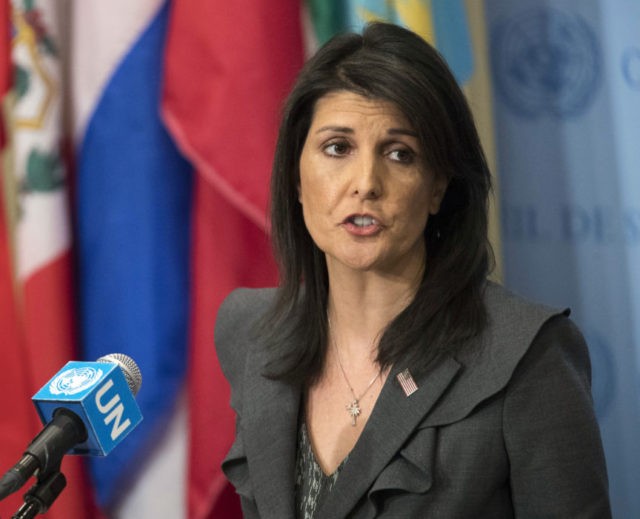U.N. Ambassador Nikki Haley said on Wednesday that Iran’s authoritarian government is reeling under the pressure from renewed U.S. sanctions. “They feel weak and we are suffocating them to the point that they have to address ballistic missiles; they have to address their support on terrorism,” she contended.
Haley told Bret Baier of Fox News that Iran is “absolutely the spoiler in Syria,” a threat to Israel, and a destabilizing force all across the Middle East. She said this is why pulling out of the Iran nuclear deal to interrupt Tehran’s cash flow was so important.
“November 5, we’re going to hit their oil, we’re going to hit their foreign banks, and so they’re really going to start to feel it,” she said. “I think at the end of the day what you’re seeing is nothing is going to fix Iran until Iran fixes itself.”
Haley was not concerned with the efforts of individuals such as former Secretary of State John Kerry to undermine President Trump’s Iran policy, because the November 5 round of sanctions would hit the tyrants of Tehran so hard that “waiting Trump out” would be impossible.
When Baier asked if the pressure from sanctions could hurt the Iranian people or unleash chaos after causing the regime to collapse, she replied that stopping Iran’s nuclear weapons program was the paramount American objective, but weakening the regime could also help the people secure much-needed changes in their oppressive government.
“Our focus right now is on the Iranian people,” she said. “They have protested, they have spoken out, they have said they want a better life. I think our main focus is obviously on the Iranian regime as well as the IRGC specifically and I think that they have to make a decision. But at the end of the day, we can’t allow them to have any nuclear programs.”
The IRGC is the Islamic Revolutionary Guard Corps, the Islamist military unit loyal to Iran’s theocracy and responsible for most of its destabilizing actions in other countries.
Haley said President Trump’s foreign policy strategy involves isolating and weakening tyrannical regimes instead of supporting or indulging them in the hope that sustained contact will someday inspire them to reform:
If you look at what [President Trump] has done with North Korea and it’s really led the international community to isolate North Korea to where they decide, you know, they realize they have a decision to make.
He led on the fact that he pulled out of the Iran Deal, forcing the entire world to admit the fact that Iran was not behaving properly.
He’s led in Syria to make sure that chemical weapons are not being used and he’s warned against them being used again.
I think if you look in the Western Hemisphere, which we’ve spent the last few weeks focused on and whether it’s Venezuela or Nicaragua, the messages are being sent that we’re not going to support dictators. We are no longer going to give money to people who are against the U.S., or say “Death to America,” or do anything that would be anti-U.S.
“We are now going to strategically start to work with our friends and we are no longer going to be handouts for those that go against us,” she concluded, going on to include the Palestinians in the list of parties that “have their hand out asking for money” while they “badmouth the United States.”
The Associated Press found considerable evidence to support Haley’s thesis in Tehran, writing on Thursday of a “darkening mood descending across Iran as American sanctions take hold.”
The people in Tehran’s Grand Bazaar the AP interviewed were all keenly aware of the hard times gripping their country – they were stocking up on necessary goods now because they expect the currency to collapse and their savings to vanish – but they mostly seemed inclined to blame their government, including the secular leader described in the piece as “the relatively moderate President Hassan Rouhani.” (Western media seems noticeably less inclined to simply portray Rouhani as a “moderate” these days.)
Iranians also complained President Barack Obama’s nuclear deal was a windfall for Iran that quickly disappeared into foreign adventures instead of benefiting the Iranian people.
“While Iranians remain angry at Trump over adding them to his travel ban and pulling out of the deal, many feel even angrier at their own government. That’s due to a steady stream of corruption cases and allegations of mismanagement by officials,” the AP reported, noting that Iranians in the Grand Bazaar became visibly angry at people who tried to downplay the effect of sanctions or let their own government off the hook.
“Ninety percent of our problems are because of the infighting. I don’t know why but the government and the supreme leader have differences. Only 10 to 5 percent is because of America,” one salesman said.

COMMENTS
Please let us know if you're having issues with commenting.